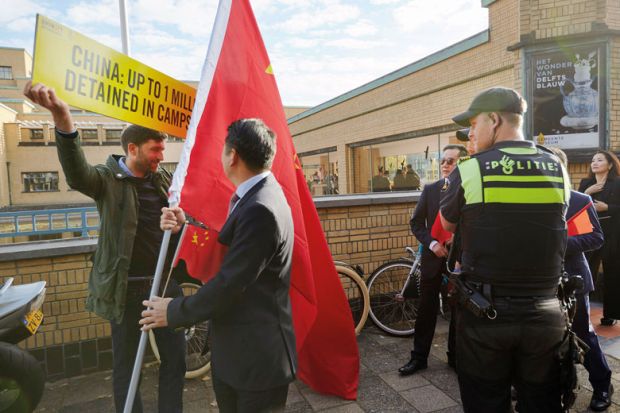European universities must adopt a measured approach underpinned by “clear policies” to guide collaboration with their Chinese counterparts, experts said.
Vrije Universiteit Amsterdam faced heavy criticism when it was forced to repay Chinese subsidies received by its human rights institute, which was accused of downplaying repression in China’s Xianjiang region, widely described as being a site of mass internment and, allegedly, torture. The Cross Cultural Human Rights Center had claimed that there was “definitely no discrimination of Uyghurs or other minorities in the region”.
Following similar flare-ups elsewhere in Europe, analysts said institutions needed to set explicit boundaries for their overseas collaborations.
“We need clear policies on what can be done and what can’t be done, so we don’t close the door on everything that’s called China,” said Thomas Jørgensen, a senior policy coordinator at the European University Association. “It’s very important for universities to say, ‘We keep collaborating, but we do it responsibly.’”
He commended VU Amsterdam on its actions. “It’s important that you have strong university leadership and governance that can say, ‘We have clear rules; the rules have been broken, and this has consequences.’ This is an example of a university that was able to do that.”
Dr Jørgensen empathised with institutions seeking to navigate uncertainty in forming strategic partnerships overseas.
“For many years, universities were told that one thing you need to do absolutely is work with China because it’s such a growing and important partner,” he said, adding that it could be difficult to tell which Chinese institutions had “special connections” with the Chinese Communist Party.
“Universities, certainly in continental Europe, have been underestimating the issue of foreign interference and knowledge theft for a long time,” agreed Kurt Deketelaere, secretary general of the League of European Research Universities. But he, too, thought that “a lot of problems can be avoided”.
Professor Deketelaere suggested that guidelines recently published by the European Commission could help institutions assess potential risks. Under them, each university is advised to create a foreign interference committee to consider the risks and benefits of international collaboration.
Such a set-up is not unlike committees that review the ethics of third-party donations, noted Jan Palmowski, secretary general of the Guild of European Research-Intensive Universities.
“It is important that we ensure we can collaborate with scientists anywhere, but we do need to be vigilant for when academic freedom in these collaborations is curtailed,” he said.
In many ways, the Dutch case harks back to concerns raised by universities hosting China’s Confucius Institutes. In recent years, universities in the US, Belgium and Germany have been among those to sever ties with Confucius Institutes amid accusations of their meddling in academic freedom.
A spokesperson for the University of Hamburg, which cut ties with its Confucius Institute in 2020, said that even before recent events in the Netherlands, the university had “grown more cautious” on collaboration.
“Questions of cybersecurity and prevention of data theft have also been cause for the university to rethink its prior, perhaps somewhat naive, practices,” the spokesperson said, adding that it has since set up a screening process for international projects.
While experts backed similar approaches, they noted that, ultimately, universities could only do their best to mitigate threats.
“It’s a risky world,” said Dr Jørgensen. “You shouldn’t expect that you get a perfect model and nothing will ever happen – but you can expect that universities will have the means to deal with that.”




